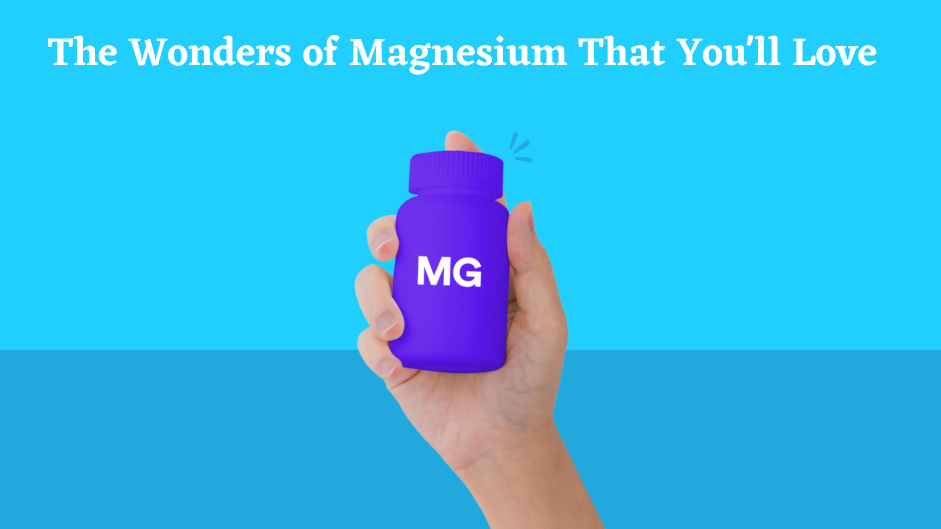Health
The Wonders of Magnesium That You’ll Love
Magnesium is one of the most underrated minerals in the world. Though it is not as well-known as some other minerals, magnesium is essential to human health. Magnesium helps regulate blood pressure, supports cardiovascular health, and assists in energy production. Magnesium also plays a role in cognitive function, bone health, and muscle relaxation. In short, magnesium is a mineral that is crucial for overall health and well-being.
Magnesium deficiency is common, especially in developed countries. Symptoms of magnesium deficiency include muscle cramps, tension headaches, fatigue, and anxiety. Fortunately, it is possible to correct magnesium deficiencies with diet and supplements.
If you are looking for a mineral that can support your overall health, magnesium is a great option. Magnesium deficiencies are common, but they are easily correctable. Magnesium supplements can help improve your health in a variety of ways. If you are looking for a way to support your health, magnesium may be the answer.
What is Magnesium?
Magnesium is an element that is found in nature. Magnesium is the eighth-most abundant element on Earth and is the third most common metal. Magnesium can be found in many different minerals including dolomite, magnesite, and mineral spring water. Magnesium has a variety of uses in industry and commerce. Magnesium is also important for human health and is required for many biochemical reactions in the human body. Magnesium deficiencies can lead to a variety of health problems. Magnesium supplements are available for people who do not get enough magnesium from their diet.
What Does Magnesium Do In The Body?
Magnesium is an essential nutrient that helps the body perform many important functions. Magnesium is involved in energy production, nerve transmission, muscle contraction and relaxation, blood clotting, and protein synthesis. Magnesium also influences bone health and plays a role in preventing and managing conditions such as hypertension, type 2 diabetes, heart disease, and osteoporosis. Magnesium deficiency is relatively common, particularly among older adults, and can lead to a number of health problems. Magnesium supplements are available in various forms and can be an effective way to increase magnesium intake.
What Causes Low Magnesium?
There are many reasons why someone might have low magnesium levels. Magnesium is a mineral that is found in the body and is responsible for hundreds of different biochemical reactions. When magnesium levels are low, it can cause a whole host of problems. Some of the most common causes of low magnesium levels are:
- Diabetes
- Alcoholism
- Kidney disease
- Certain medications (such as diuretics, antibiotics, and asthma inhalers)
- Poor diet
If you think you might have low magnesium levels, it’s important to speak to your doctor. They can order a simple blood test to check your magnesium levels and make sure that you’re getting enough of this important mineral. Magnesium deficiency is easily treated with supplements, so there’s no need to worry if you think you might be deficient. Speak to your doctor today and get started on the road to recovery!
Symptoms Of Magnesium Deficiency
Magnesium deficiency is relatively common, especially among older adults. Symptoms of magnesium deficiency can include loss of appetite, nausea, vomiting, fatigue, weakness, and muscle cramps. More severe magnesium deficiency can lead to numbness and tingling, seizures, personality changes, and abnormal heart rhythms.
Magnesium Rich Foods

A magnesium deficiency can lead to symptoms like fatigue, muscle cramps, anxiety, and migraines. Magnesium-rich foods can help prevent or relieve these symptoms.
Some good sources of magnesium include dark leafy greens, beans, nuts, seeds, and whole grains. Here are 10 healthy foods that are high in magnesium.
1. Spinach
2. Swiss Chard
3. Beet Greens
4. Bok Choy
5. Broccoli
6. Brussels Sprouts
7. Kale
8. Beans
9. Nuts
10. Seeds
PROS of Magnesium
Magnesium is a mineral that is important for many functions in the body. Magnesium helps to regulate blood pressure, maintain muscle and nerve function, and keep a healthy heartbeat. Magnesium supplements are available in tablet or capsule form, and are often recommended to people with conditions such as high blood pressure, heart disease, and diabetes. Magnesium is also found in many foods, such as green leafy vegetables, nuts, and whole grains. Magnesium supplements are generally safe, but side effects can include diarrhea, nausea, and abdominal cramping. If you have any medical conditions or take medications that might interact with magnesium supplements, be sure to speak with your healthcare provider before taking them.
CONS of Magnesium
While magnesium is generally safe and well-tolerated, there are some potential drawbacks to using this mineral supplement.
1. Magnesium can cause gastrointestinal problems such as diarrhoea, constipation, and nausea.
2. Magnesium can interact with certain medications, including antibiotics, blood pressure medications, and diuretics.
3. Magnesium can cause adverse effects in people with kidney disease.
4. Magnesium can cause a laxative effect and can lead to dehydration.
5. Magnesium supplements may not be suitable for everyone, and people should speak with their doctor before taking them. Magnesium is a safe and effective mineral supplement when used appropriately, but it is important to be aware of the potential drawbacks before starting supplementation.
What type of magnesium should I buy?
There are many different types of magnesium available on the market. Magnesium oxide is one of the most common forms, and is known for its high absorption rate. Magnesium chloride is another popular form, and is known for its ability to support healthy nerve function. Magnesium citrate is also a popular choice, and is known for its detoxification properties.
Magnesium glycinate is a less common form, but is known for its ability to support optimal muscle function. Magnesium malate is another uncommon form, but is known for its ability to reduce fatigue and improve energy levels. Magnesium taurate is the least common form, but is known for its ability to support cardiovascular health. So, which type of magnesium should you buy?
The answer may depend on your individual needs. If you are looking for a magnesium supplement to support overall health and wellness, then any of the above forms would be a good choice. If you have a specific health concern that you are hoping to address with magnesium, then you may want to choose a specific form based on its known benefits.
For example, if you are looking to improve nerve function, then magnesium chloride would be a good choice. If you are looking to detoxify your body, then magnesium citrate would be a good choice. And if you are looking to support optimal muscle function, then magnesium glycinate would be a good choice. Ultimately, the best way to determine which type of magnesium is right for you is to speak with a healthcare professional. They can help you understand your individual needs and recommend the best form of magnesium for your specific situation.
References
https://ods.od.nih.gov/factsheets/Magnesium-HealthProfessional/
https://www.mayoclinic.org/drugs-supplements-magnesium/art-20368097
https://www.webmd.com/vitamins/ai/ingredientmono-998/magnesium











